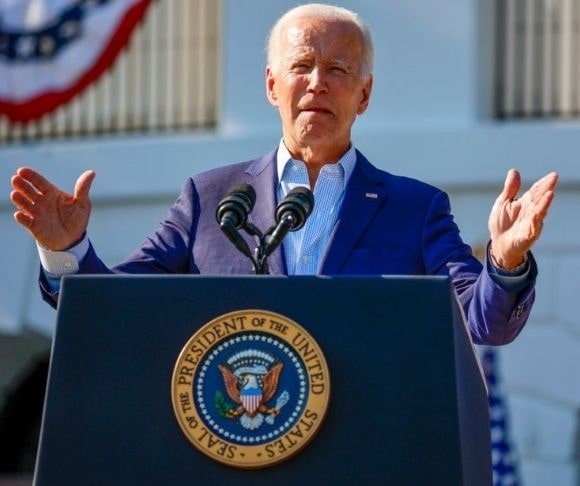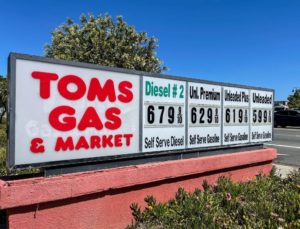
Joe Biden (Photo by Tasos Katopodis/Getty Images)
President Joe Biden has a message for those evil mom-and-pop gasoline station owners: Cut your prices now! In recent months, the administration has routinely pointed the finger at the people who flip the numbers on the sign instead of exploring the root cause of the nation’s energy woes. This time, the president’s random afternoon tweet caught the attention of billionaire Jeff Bezos and a Chinese state journalist. Even more comical about Biden’s remarks is that they came after the US government canceled another oil and gas lease sale. What is going on at 1600 Pennsylvania Avenue?
A Tweet Day Afternoon
 “My message to the companies running gas stations and setting prices at the pump is simple: this is a time of war and global peril,” Biden tweeted July 2. “Bring down the price you are charging at the pump to reflect the cost you’re paying for the product. And do it now.”
“My message to the companies running gas stations and setting prices at the pump is simple: this is a time of war and global peril,” Biden tweeted July 2. “Bring down the price you are charging at the pump to reflect the cost you’re paying for the product. And do it now.”
Amazon founder Jeff Bezos took exception to these comments, replying that this was “either straight ahead misdirection or a deep misunderstanding of basic market dynamics.” This prompted a reaction from White House Press Secretary Karine Jean-Pierre, who argued that the current situation is “not ‘basic market dynamics.’ It’s a market that is failing the American consumer.” She was referring to a recent price drop in crude oil, which was not reflected in similarly falling prices at the pump.
Many mocked Jean-Pierre and Biden’s statements, alluding to officials’ paucity of understanding of the energy industry’s intricacies. However, Biden did find support from Chen Weihua, a columnist and bureau chief for state-run China Daily EU, who tweeted: “Now U.S. President finally realized that capitalism is all about exploitation. He didn’t believe this before.”
The world is living through exciting times when Beijing celebrates a US president and a left-leaning billionaire slams a Democratic commander-in-chief. But what is the deal with prices anyway?
Let’s Get Down to the Brass Tacks
Indeed, crude prices have eased in recent weeks, primarily due to recession fears. But why is the cost of gas falling by only a penny or two each day? It is not due to greedy mom-and-pop gas station owners, nor is it because of Big Oil. Bezos was correct when he tweeted that this is a case of market dynamics.

Joe Biden (Photo by Drew Angerer/Getty Images)
A critical factor in gas prices has been the decline in the number of refineries. These facilities are imperative since gasoline is extracted from crude oil. Liberty Nation has reported two important points on this part of the market. The first is that the number of refineries has decreased significantly over the last 15 years, particularly on the East Coast. “In recent years, refineries have been shut down, converted to logistics terminals or converted – partially or totally – to biofuels,” IHS Markit analysts wrote last year. The second is that the refineries remaining in operation are running at or near full capacity. In addition, six are offline, which has trimmed output capacity amid soaring demand. Suffice it to say, there is a refinery shortage in the United States.
When it comes to gas prices, operators have been slow to respond to the short-term swing for multiple reasons: companies were still climbing out of the hole when the market collapsed, businesses anticipate the prices would rebound again, and stations are witnessing greater seasonal demand at this time of the year. Moreover, it is also important to point out that profit margins are remarkably low, earning just 1.4% on fuel, compared to the nearly 8% margin average in all other industries.
Now, when it comes to the overall energy sector, the federal government keeps placing hurdles in front of oil and gas producers. Soon after the administration put the kibosh on federal leases in Alaska and the Gulf of Mexico, Washington canceled the sale of oil and gas leases on public lands in Utah. The Bureau of Land Management’s (BLM) Utah office was scheduled to hold an auction on July 7, the first since Biden was inaugurated. But BLM ditched the sale to appease environmental organizations that were planning litigation. The US government will be hosting auctions in several Western states, but environmental groups say they will also file lawsuits to stop drilling on these lands.
What could make matters worse is that JPMorgan Chase warned prices could hit as much as $380 a barrel if G7 nations attempt to cap the price of Russian oil to stop President Vladimir Putin’s war in Ukraine. According to the investment bank, a worst-case scenario could see Putin cut daily crude production levels by five million, which the analysts believe Moscow could support.

(Photo by George Rose/Getty Images)
“The most obvious and likely risk with a price cap is that Russia might choose not to participate and instead retaliate by reducing exports,” the analysts wrote. “It is likely that the government could retaliate by cutting output as a way to inflict pain on the West. The tightness of the global oil market is on Russia’s side.”
Despite the barrage of bad news, the Energy Information Administration recently confirmed that US output topped 12 million barrels per day in June for the first time since April 2020.
Will a Recession Save Biden?
The Federal Reserve is trying to achieve a soft landing, an objective clearly becoming nearly impossible to accomplish. The US central bank is raising interest rates while also trying to sustain growth and ensure the labor market holds steady. This is unlikely to happen, and the proof is already in the data. As a result, investors have been frightened by the dreaded “R” word, with energy prices responding to falling demand concerns. Should the country slip into a recession and the labor market stabilize, gas prices may finally slide. The question is: Would Biden declare this a victory?
Remember to check out the web’s best conservative news aggregator
Whatfinger.com — the #1 Alternative to the Drudge


